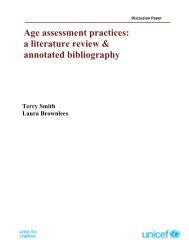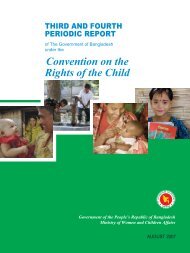Government-funded programmes and services for vulnerable - Unicef
Government-funded programmes and services for vulnerable - Unicef
Government-funded programmes and services for vulnerable - Unicef
Create successful ePaper yourself
Turn your PDF publications into a flip-book with our unique Google optimized e-Paper software.
<strong>Government</strong>-<strong>funded</strong> <strong>programmes</strong> <strong>and</strong> <strong>services</strong> <strong>for</strong> <strong>vulnerable</strong> children in SA<br />
There is the danger that the proposed amendments contained in these two Bills, whilst<br />
they may reduce fraud, will make the birth registration process more onerous, especially<br />
<strong>for</strong> the most <strong>vulnerable</strong> of children, such as those living in poverty in rural areas <strong>and</strong><br />
those living with families affected by HIV/AIDS.<br />
Births <strong>and</strong> Deaths Registration Amendment Bill<br />
This Bill proposes a number of amendments to the birth registration process which will<br />
have an impact on the ability of caregivers, especially of <strong>vulnerable</strong> children, to register<br />
their births.<br />
The Bill proposes that the birth of a child may only be registered by one of the child’s<br />
parents, unless the parents are deceased. At present, the Act allows an alternative person<br />
to register the birth of a child if the parent(s) are unable to register the birth themselves.<br />
This raises concern in the case of absent parents or the case of parents being too ill to<br />
register the birth of their baby.<br />
The Bill appears to reduce the time allowed <strong>for</strong> the early, as opposed to the late, registration<br />
of the birth of a baby. The current law regards any registration be<strong>for</strong>e the age of one year<br />
as an early birth registration <strong>and</strong> imposes an already onerous process <strong>and</strong> set of criteria<br />
on applicants seeking to register the birth after one year. Article 4 of the Bill reduces the<br />
time within which an early registration may take place from one year to 30 days after the<br />
birth, <strong>and</strong> further envisages an even more onerous late birth registration process after the<br />
30-day period has expired. This creates the risk of frustrating the registration of the birth of<br />
<strong>vulnerable</strong> children whose births are not registered within 30 days of their birth.<br />
Article 6 of the Bill does, however, seek to introduce some relief <strong>for</strong> <strong>vulnerable</strong> children<br />
who have lost their parents, by allowing <strong>for</strong> the registration of the birth of an orphaned<br />
or ab<strong>and</strong>oned child by a social worker. Moreover, the Bill seeks to make provision <strong>for</strong><br />
recording adoptions in the birth register in accordance with an adoption order granted by<br />
the court. The latter provision is one among a number which seek to align the terms <strong>and</strong><br />
provisions of the Births <strong>and</strong> Deaths Registration Act with the Children’s Act of 2005.<br />
South African Citizenship Amendment Bill<br />
The main objective of the Bill is to revise the provision in the South African Citizenship<br />
Act of 1995 relating to the acquisition of citizenship by birth, descent or naturalisation.<br />
The Bill provides <strong>for</strong> the acquisition of citizenship by birth <strong>for</strong> a child born outside the<br />
Republic of South Africa, but whose parents, or one of whom, is a South African citizen.<br />
The Bill confirms that if a child is born in South Africa to parents, one of whom lives in<br />
South Africa but has not been granted permanent residence <strong>and</strong> the other who is not a<br />
South African citizen, the child is not a South African citizen.<br />
The Bill introduces a progressive measure in guaranteeing the right of a child with no<br />
citizenship or nationality <strong>and</strong> no right to such citizenship or nationality in any other<br />
country, the right to South African citizenship.<br />
Furthermore, the Bill recognises a child born to parents who have been granted<br />
permanent residence status, as a South African citizen by birth, provided the child has<br />
lived in South Africa from birth to the age of majority <strong>and</strong> his or her birth is registered in<br />
the NPR. The Bill further provides that an adopted child acquires citizenship by descent.<br />
18
















